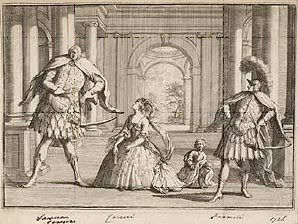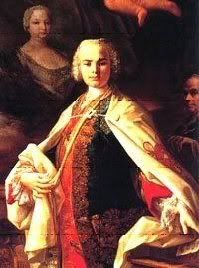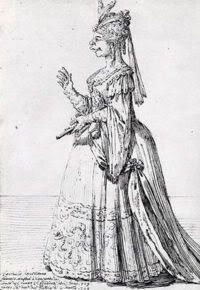From the 16th century to the dawn of the 20th, a special choir sang at the pontiff’s pleasure, grown men with the voices of angels and the range of female sopranos. There was a simple reason for their abilities: each had had his gonads surgically removed prior to achieving puberty.
I don’t know why, but the other day, while pondering the castrati (It., “castrated ones”), I started thinking about the 110th Congress. Could it be, I wondered, that we are witnessing the political equivalent of a choir of the ball-less pandering to the whims of a theological autocrat?
Naw, I thought, not our Dems – our guys are descended from the tradition of FDR and “The Buck Stops Here” Harry! We have a heritage of Massive Brass – New Deals and Great Societies that had to be shoved down the throats of backward-looking Republicans. There’s no way that folks of such stock could ever be compared to emasculated servants performing at the whim of a king, nor to the haunting voice of the very last castrati, the only one whose voice was ever recorded.
Or could they?
Gender-Bending the Rules
Pope Clement VIII (r. 1592-1605) had a bit of a problem: he loved the sound of angelic choirs, and desperately wanted one for his private Sistine Chapel, but 1 Corinthians 14:34 was pretty clear that women attending services should be seen and not heard:
Let your women keep silence in the churches: for it is not permitted unto them to speak; but they are commanded to be under obedience as also saith the law.
Clement could have pulled a Bush Administration and simply parsed the Word of the Lord by declaring that “speaking” is different from “singing,” and that if God had meant to ban both, He’d have said so. Presumably realizing how ridiculous this explanation would have sounded (on some matters, heads were a bit clearer in the 17th century than they are today), Clement elected to go another route to get his choir of angels: he fired the Chapel’s boy’s choir, heretofore made up of Spanish children whose voices broke at puberty or grew into unreliable falsettos, and replaced them with castrati, whose larynxes would never suffer such fates.
Castration has been known since long before Nancy Pelosi took impeachment off the table, of course; the practice dates back at least to ancient Babylon, with the legal status of eunuchs being discussed in both Hammurabi’s Code (192-193) and the Roman Digest of Laws. Legal scholars in ancient India debated whether or not the offspring of eunuch is entitled to inheritance, which has led to some modern debate as to whether or not the term used in the Kamasutra and the Laws of Manu defines a “third sex,” or just means regular ole’ run-of-the-mill homosexuality (discussion ibid.). Perhaps Larry Craig, though admittedly neither a Democrat nor a Hindu scholar, might cross the aisle to shed some light on the matter.
Somewhere along the course of history, somebody realized that if a male’s testicles are removed prior to puberty, the deepening of the voice experienced by most boys never happens. It didn’t take an operatic genius to put two and two together (or apart, as the case may be); as early as the 5th century, Byzantine rulers were being entertained by castrated singers, and later, choirs of them sang in the Hagia Sofia.
Though Congress-like halls filled with gonadless performers disappeared from the European scene with the sack of Constantinople by Catholic Crusaders during the Fourth Crusade, it’s pretty likely that some “hidden castrati” later wound up in the choirs of the Spanish falsettos in Rome, given that large tracts of Spain were still under the control of the Muslims, in whose courts eunuchs were relatively commonplace. Since the harem-keepers nearly always reserved eunuch status for those of conquered and subject populations, odds are that the practice was secretly kept alive in Spain before castrati began cropping up in the ranks of the Vatican’s falsetto recruits in the mid-15th century.
(before we get too cocky about this, we progressives ought to remember that there may have been “hidden castrati” in Congress before the 2006 elections, and that they managed to remain unidentified only because the Republican majority kept steamrollering over their flaccid selves. Certain moonbats in Colorado, for example, have certain theories about certain of our Senators, for example…)
In 1589, the improbably-named Pope Pope Sixtus V (r. 1585-1590) sidestepped the Constitution Holy Scriptures through a signing statement papal bull that specifically allowed castrati to perform in a church in Munich. By Clement’s time, the idea of creating specialized singers by castrating boys had thus been fully transmitted from the harems of the east to the cathedrals of Italy, and in 1599, he brought them into the Sistine Chapel for a run that would last four centuries. At the height of castrati popularity in the 17th and 18th centuries, upwards of 4000 boys underwent the operation (such as it was) every year, nearly all of them from the marginalized classes of Italy.
Giving Two for the Team
A non-release of voice-deepening hormones was not the only effect of prepubescent castration – there were others, physical and psychological, as well. First off, not everyone survived the procedure in a time when sanitary conditions approached those endured by our veterans at Walter Reed (though presumably the story was the same: people in positions with gravitas made promises, then followed-through lamely, perfunctorily – or a finger at all).
 Promising sopranos of around the age of ten were first opiated, then immersed in warm water. If all went well, the kid was drugged enough to have passed out before a “surgeon” would either snip the ducts connecting the testes, or tie them off to wither on the vine. Assuming the lack of antiseptics didn’t kill him, the child would go on to intensive vocal training, which expanded his rib cage to unheard-of-outside-La-Paz-Bolivia degree. This was due to one of the many side effects of the procedure:
Promising sopranos of around the age of ten were first opiated, then immersed in warm water. If all went well, the kid was drugged enough to have passed out before a “surgeon” would either snip the ducts connecting the testes, or tie them off to wither on the vine. Assuming the lack of antiseptics didn’t kill him, the child would go on to intensive vocal training, which expanded his rib cage to unheard-of-outside-La-Paz-Bolivia degree. This was due to one of the many side effects of the procedure:
Another physical development of the castrati was the expansion of the rib cage into a rounder shape. The different position of the larynx and the enlarged rib cage combined with the muscles developed from the rigorous breathing exercises in their training to give the castrati a physical mechanism for singing that blended characteristics of the unaltered male voice with the unique physiological changes they underwent (eg., their adult lung capacity providing breath for their boy-sized vocal chords). Hence, they were able to exploit their unusual physical development with their strenuous conservatory training and produce a voice that exceeded the capabilities of unaltered voices.
Voicing Gender: Castrati, Travesti, And the Second Woman in Early Nineteenth Century
But while an even-more-puffed-out-chest and a voice built for extended bloviation might seem like it would be at the top of every Dem Congressperson’s wish list (barely edging out “restoring habeus corpus” and “ending the war”), there were serious drawbacks:
Most castrati suffered from the effects of developmental hypogonadism, including infantile penis and an underdeveloped prostate. They also had more developed subcutaneous fat than the normal male, fat deposits localized on the hips, buttocks and breast areas, fatty deposits on the eyelids, and skin that sometimes appeared wrinkled or swollen. The arms and legs of many castrati were unusually long as compared to the torso (the long bones never stopped growing), which made them look distorted.
If you can believe it, the procedure even got the Church to behave a bit hypocritically – castration for the purposes of making a singer was still forbidden by Canon Law, and the same clergy that prosecuted poor folk for selling their children into disfiguring servitude was the same clergy that enjoyed their sweet serenades under the most beautiful ceiling on Earth:
Although the Roman Catholic Church absolutely forbid (sic) the practice of human castration, promising death to its perpetrators and immediate excommunication to its accomplices (namely the parents of the unfortunate young lad), they willingly cast a blind eye upon those boys castrated “by accident,” who entered into their choirs. Admitted usually under the pretense of some falsified excuse for having been castrated (a favorite was the ill-placed bite by wild pigs, or falling from a horse), the castrati could not have been better suited to their job.
ANGELS WE HAVE HEARD ON HIGH: The Making of the Castrati in 17th and 18th Century Italy
The excuses we’ve heard from our own Congresstrati as to why they’ve displayed no cajones may have sounded about as plausible as being bitten in the groin by feral hogs, but there are some not-so-subtle class – jury’s still out on moral – distinctions between they and those who engaged in the musical-slave trade:
Almost invariably, these castrated children were a product of the destitute-families either too poor to provide for their beloved children, or parents so vulgar that they would bind their sons forever to a life of music, in the vain hope that he would be the next most illustrious castrato, and a wise investment.
 Finally, it seems that to those without connections, finding a place to get the surgery done was about hard to find as an abortion clinic in Spongebob Dobson’s Fantasy America:
Finally, it seems that to those without connections, finding a place to get the surgery done was about hard to find as an abortion clinic in Spongebob Dobson’s Fantasy America:
I inquired throughout Italy at what place boys were chiefly qualified for singing by castration, but could get no certain intelligence. I was told at Milan that it was at Venice; at Venice, that it was at Bologna; but at Bologna the fact was denied and I was referred to Florence; from Florence to Rome, and from Rome, I was sent to Naples. The operation most certainly is against the law in all these places, as well as against nature; and all the Italians are so much ashamed of it, that in every province they transfer it to some other.
Music historioranter Dr. Charles Burney (1726-1814 ), via ibid.
Seems those 18th century castrati-makers could have taught our Dem caucus a thing or two about how renditioned (is that the right word? I always get them confused with the desaparecidos) people might be hidden from moralizing, prying eyes. Guess it’s just a damn shame that there aren’t any investigators out there worthy of the legacy of some powdered-wig-wearing, church-organ-playing Englishman who’s been dead lo, these two hundred years.
The Price of Fame is the Tear of a Clown
At first glance, a ten-year-old Italian peasant boy being semi-involuntarily neutered may not seem to have much in common with a duly-elected U.S. Congressperson who has taken to repeating the mantra “we don’t have the votes,” but just beneath the surface, we can see that they are, in fact, a lot alike. Their condition assured a lot of castrati of work in at least a choir somewhere (by the mid-17th century, upwards of 70% of choirs in the Papal States and parts of the Holy Roman Empire were made up of castrati), just as even the most compliant congresscritter is virtually assured of getting a soundbite on the air (provided it’s obsequious enough). There was also a similar (if very small) chance at super-stardom; truly talented castrati were invited to all the fashionable parties, sang in only the best opera houses, and basked in the reflected glow of the monarchs and theocrats for whom they performed.
Also like our Congress – though more on the Republican side, in this case – the sexual reputation of the castrati shocked, titillated, and scandalized. Their prowess seems to have been exaggerated, but as our Reps and Senators have since learned, there were definite advantages to holding a non-impregnating status:
Interestingly though, and contrary to what one might expect, many castrati experienced an active sex-life. While their libidos were markedly low, most castrati were capable of erection and even ejaculation, though their ejaculate consisted solely of prostate fluid.
The Castrati: Giving Up Your Balls For St Paul (altpenis.net)
…and though the following two sources are speaking of eunuchs and ancient imperial courts, the implications for the castrati are pretty clear:
“There are women who like the ineffective eunuchs because their kisses are always soft and they don’t have beards and because an abortive drug is not necessary.”
—Juvenal“You ask, Pannychus, while your Celia has so many eunuchs? Celia wants to have sex without appearing to.”
—Martialboth sources cited from the footnotes of this article; they and several others editorialize on the latent homophobia present in the expressions
 One must also consider the possibility that there were certain wide-stancers among the nobility who always wondered what happened behind the doors of adjoining livery-stable outhouses, and that they might have been prompted to try some Ted Haggard-style research. One shudders to think of the sorts of abuses heaped upon those hundreds of thousands of castrati who failed to break into the big time, especially given that they lived in an age when closeted self-loathing could find expression in acts that would make Fred Phelps seem reasonably tame.
One must also consider the possibility that there were certain wide-stancers among the nobility who always wondered what happened behind the doors of adjoining livery-stable outhouses, and that they might have been prompted to try some Ted Haggard-style research. One shudders to think of the sorts of abuses heaped upon those hundreds of thousands of castrati who failed to break into the big time, especially given that they lived in an age when closeted self-loathing could find expression in acts that would make Fred Phelps seem reasonably tame.
Regarding their appearance and temperament, this piece makes the castrati sound like a bunch of Rush Limbaughs with singing pipes, but it’s pretty telling that the best of them were allowed to go toe-to-toe with the most respected composers of the day:
Castrati tended to be fat, volatile, conceited, and almost impossible to get along with. Composer George Frederick Handel’s notorious shouting matches with his castrato Senesino, for instance, were well-known throughout England.
::snip (sorry)::
There were other ways in which the castrato reigned supreme. On the stage, he was the undisputed star. A composer was merely hired help who labored at the castrato’s pleasure. If, for example, the arias written for a castrato did not please the singer, he could demand — and receive — a complete rewrite. If the composer balked, which he seldom did, then the castrato would take the music and libretto to his own composer for the necessary alterations.
Like our own Congress, the castrati were very well compensated for the roles they played. Senesino, mentioned above, received 3693 ducats for one season’s singing, while the opera house’s copyist made 8. One has to think that working for a star who was making 460 times more than him virtually guarantees that that cramp-handed quill-wielder would have understood far too well the modern complaints about outrageous salary packages for CEOs. Indeed, much like an ensconced, emasculated incumbent in a too-safe-to-worry-about-the-primaries district, the very wealthiest of the castrati were able to afford to purchase their own private dukedoms in the hills of Italy.
As former Little Leaguers will tell you, it’s real tough to make it to the big time. Most castrati learned this lesson the double-hard way, and wound up taking gigs in massed choirs, turning to straight acting (no females on stage there, either), or, in some cases, to prostitution. To make matters worse, the castrato opera circuit was always relatively small, and it shrank with time and evolving morals until, in the end, it was permitted in an area only about the size of the new U.S. Embassy in Baghdad.
But They’re Doing What They Can!
This is true; our Congress has indeed shown up to work on most mornings (even though it does appear that they’re backing off from the 5-day-a-week chest-thumping of ten months ago – see October 27, 2007, New York Times, Democrats Plan a Shorter Workweek). They’ve introduced some legislation (thanks for the minimum wage hike, btw), painted a handful of non-retiring, non-ensconced Republicans into a Bush-supporting corner or two, and ensured that Dem ’08 powder is the driest damn powder in the history of bone-dry powders. Yet none among them has risen to the status of “rock star” (though one or two have held and subsequently squandered the title), and herein lies a key difference between our ball-less Congress and those ball-less opera singers of a few centuries back. Take this aircraft-carrier-worthy entrance, for example:
One famous and temperamental castrato by the name of Luigi Marchesi, demanded that in every single opera – no matter which – he enter at the top of a hill donning a sword and a plumed helmet required to be “at least six feet high, begin by saying ‘Where am I?'” and after a loud blast of the horns, crying ‘Hear the sound of the war-like trumpets!'”
 If we look at Democratic successes under Pelosini, Hoyercini, and Reidinelli as the performance of a choir that generally sings along in compliant accompaniment to Bush’s mad conducting, then what we lack and the Baroquies had are center-stage-hogging, super-talented prima donnas willing to take on the baton. Probably the most famous castrato of all time was a guy named Carlo Broschi Farinelli, among whose legendary exploits is listed just such a John Henry-like duel:
If we look at Democratic successes under Pelosini, Hoyercini, and Reidinelli as the performance of a choir that generally sings along in compliant accompaniment to Bush’s mad conducting, then what we lack and the Baroquies had are center-stage-hogging, super-talented prima donnas willing to take on the baton. Probably the most famous castrato of all time was a guy named Carlo Broschi Farinelli, among whose legendary exploits is listed just such a John Henry-like duel:
One night he was performing in an opera in which one aria was accompanied by the orchestra and a solo trumpet. The trumpeter was a man of great skill who had been brought in especially for this performance. In the middle of the aria, Farinelli decided it would be fun to challenge this renown trumpeter to a musical duel. On they went for some time, each matching the other note for note, the audience cheering them on. The trumpet would play a difficult flourish and Farinelli would follow. Then Farinelli would perform an impossible run that the trumpet would duplicate. Just as the contest appeared to be a draw, the trumpeter faltered on a very high note and Farinelli won the contest. The crowd went wild. The trumpeter, like the good sport that he was, leaped on the stage and shook Farinelli’s hand. Only after the audience had composed itself was the opera allowed to continue.
We should expect no handshake from Bush when our duel is done, but at this point, that’s putting the cart before the horse: we apparently don’t even have a man of Farinelli’s skill (or, dare I say, balls) who’s willing to pick up the gauntlet the Preznit had tossed down. Would that it were otherwise: the voice of Farinelli was said to heal the sick and alter the fates of nations, and we could sure use us one a’ them right about now.
 Farinelli (1705-1782; for purposes of gee-whiz context, Ben Franklin lived 1706-1790), whose stage name is an homage to his teachers, was, from his first public performance in Naples in 1720, destined for great things. After he sang in Milan at the age of 23, his became one of the most sought-after voices in Europe – Louis XV of France had him sing in the Queen’s apartments in Versailles, and competing opera houses in England (one of which was operated by Handel, the other by the German Prince of Wales) eventually drove him out of public performance altogether.
Farinelli (1705-1782; for purposes of gee-whiz context, Ben Franklin lived 1706-1790), whose stage name is an homage to his teachers, was, from his first public performance in Naples in 1720, destined for great things. After he sang in Milan at the age of 23, his became one of the most sought-after voices in Europe – Louis XV of France had him sing in the Queen’s apartments in Versailles, and competing opera houses in England (one of which was operated by Handel, the other by the German Prince of Wales) eventually drove him out of public performance altogether.
At the age of the 31, the great Farinelli – who had a range greater than three octaves – left the stage and took up a position that was even more influential, if not quite as spotlit. Summoned to the court of Spain, the singer’s voice lifted King Philip V out of severe depression, and he went on to spend 20 years as private singer to the King and his successor, Ferdinand VI. As such, he was enormously influential in the court, and was even knighted into the nobility (he considered this a great honor, even though he, unlike many castrati, came from a moderately-influential family with a musical background). Alas, all good things must come to an end, and when the King died in 1759, Farinelli was generously stipended and politely exiled to a retirement in the hills around Bologna.
When It Just Isn’t New Any More
The castrati provided the Italian soundtrack for the Baroque period (roughly, the 17th century), the operas of which – at least the Italian ones – tended to be serious in nature. They had to be; opera houses were among the few places outside the Church where stories could be told and imaginations fired in grand nonconformity, but as time went on, productions got sillier and sillier, and by 1760 or so, opera seria was on the wane and comic and ballad operas on the rise. Even Wolfgang Mozart (1756-1791) wrote a castrati part for his serious opera Idomeneo, but later in his career he, like many composers of his generation, found he’d had enough of the castrati’s crap and later wrote them out of the action entirely. Rossini and Weber both insisted that the castrati sings their arias as written, and not to go off making up stuff on their own (…maybe there’s a lesson in there regarding our contemporary Congrestrati…).
The last opera written with a part for a castrato was performed by Giovanni Battista Velluti (1781-1861), playing “Armando” in Meyerbeer’s Il Crociato in Egitto in Venice and London. The 1825 London gig marked the last performance of a castrato in an operatic role – things had changed in the 100 years since Handel and Senesino, and in the 25 since there’d last been a castrato in town, and now the papers urged folks to keep away from the reminders of their relatively recent past.
Napoleon (r. 1799-1815) loved their sound – he was apparently entranced by a pair named Pacchierotti and Crescentini – even though his Code explicitly forbade the castration practice. Still, his French legal system was the one adopted by Italy when it unified in 1870, which made only those places under the Pope’s control castrati-friendly. Even the Pope couldn’t stand up to that kind of pressure for long, though: in 1878, Pope Leo XIII issued a bull that forbade the hiring of new castrati, which he reiterated as a policy in 1903. Pope Pius X brought the matter full-circle when he issued his own Clement-countermanding orders upon putting on the Fisherman’s Ring himself in 1903:
“Whenever . . . it is desirable to employ the high voices of sopranos and contraltos, these parts must be taken by boys, according to the most ancient usage of the Church.”
Those that still remained would be permitted to linger; as with so much in the Church and in politics, time and attrition would take care of the rest. As the 20th century dawned, the castrati were literally the last of a dying breed, relics of an earlier age and a completely different morality from the pre-7/14/89 mindset. Slowly they died off, until only one remained. He, Alessandro Moreschi (1858-1922), is also the only castrati to survive long enough into the information age to have his voice recorded via gramophone – here’s a clip HerbertvK on YouTube put together:
Listen to that plaintive, otherworldly voice, and tell me it wouldn’t make a perfect soundtrack for a muted viewing of C-Span. Now imagine a choirs’ worth of such voices – wouldn’t that be the proper accompaniment for the Bush Administration in general?
The thing is, nobody really knows if Moreschi was all that good compared to other castrati, since there’s no way to do the comparing. He might have been the last great one, or he might have been an average performer who simply outlived his competition – we’ll never know.
Really, there’s a lot of things we’ll never know about the castrati. Though the history books record their names and descriptions of their deeds, without hearing and seeing for ourselves, it’s nearly impossible to form an objective opinion about their performances. It’s this, especially, that links them with the 110th Congress, for the questions will be the same when future generations read about the Congresstrati – people are bound to wonder what sort of circumstances, what failings of human dignity and spirit, would have to occur for such public abuses of basic human rights to be ignored.
Most especially, they’ll wonder what the hell was motivating the Senators and Representatives who sang obediently before men whose outrageous sense of entitlement had deprived them of their very gonads.


15 comments
Skip to comment form
Author
Flame away!
my congresstrati? (what’s the singular, I wonder).
Back to click on all those links. Thanks UM.
Thank you, Brother Moonbat! I needed that!
(Insert punchline below)
I recall listening to a radio programme on castrati when driving in the country late at night. It must have been Moreschi. It started to freak me out and I had to swap channels.
I just looked at the you tube links. Though clearly just a movie, this I could listen to gladly, even when on a forest road at an ungodly hour.
see a dissertation on castrati on a political blog.
Did hear a presumably non-castrated counter tenor sing a concert of Handel’s music recently with the Ulster Orchestra. Counter-tenor is Andreas Scholl, a very fine musician.